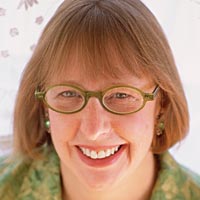|
Photograph: © Dennis Cowley
 |
|
Julia Glass
|
Julia Glass became the poster child for unlikely first-time novelists when, in 2002, at age 46 with two young children, she won the coveted National Book Award for Three Junes. The Yale-trained former artist had no formal creative writing training, making her resulting fame and bestsellerhood all the more inspiring. Now, Glass’s follow-up novel, The Whole World Over, dazzles with the same rich detail, complex interwoven plots, and psychologically compelling characters (one of whom, Fenno McLeod, has been hijacked from her earlier book). Julia Glass spoke with Victoria Lautman by phone from her new home in Marblehead, Massachusetts.
Q: There should be an advisory at the start of the book: “Do not read while hungry: main character is a pastry chef.” All those pastry descriptions drove me nuts! Are you a foodie?
A: Well, I love to eat, I love to feed people, and I’m a great cook. I joked with my friends that I wanted to write a book where desserts had to be extensively researched, since I have a terrible sweet tooth. My particular downfall is cake.
Q: Part of the story unspools in Santa Fe, at the home of the (fictional) governor of New Mexico. Did the real guv, Bill Richardson, dish out any advice?
A: Not exactly, but through a complex chain of e-mails, I did manage to get a private tour of the governor’s mansion, and was shown around the kitchen and dining room. I even met the chef for a minute, and also the governor’s wife, Barbara. But I like to do research only after I write something, and then I tinker with it, as opposed to doing the research up front, which I think can paralyze you.
Q: The book’s 9/11 element took me by surprise. Had you always planned to include that?
A: Oh, no, I never knew I would! I started writing this book in the spring of 2001, and the story was going to take place over two years, mostly in Manhattan, through 2002. I’d written a few chapters when the World Trade towers were hit. Like a lot of other writers, I just crumpled. I couldn’t write. I thought, What’s the point of writing fiction? By the time I got back to it in the spring of 2002, I [had] decided the characters would experience 9/11 as I did: touched by it, scared by it, but not having lost anyone directly. I wanted it to be authentic, and not to feel as a writer taking advantage of real drama to enhance my work.
Q: It’s been suggested that you’d never have become a writer if not for your own personal tragedies: the suicide of your sister in ’92 and your two bouts with breast cancer. What do you think?
A: I can’t disagree with that. A friend of mine said that suicide remains a question that can never be answered, and that I turned towards fiction as a response to my sister’s death. That sent a chill down my spine. I had been a figurative painter, but I’ve left it behind, and now I just don’t have time for it in my life.
Q: You must be feeling a little pressure to repeat your Three Junes success . . .
A: The pressure I feel now is that I’m paying a mortgage for the first time in my life. We always lived from hand to mouth before, in a tiny apartment, and now at age 50 I really do feel like a kid playing grownup. It’s a delightful and extraordinary thing.
Hear Julia Glass talk with Victoria Lautman, Sunday, June 11th, 11:45 a.m. to 1 p.m. at Lookingglass Theatre, 821 N. Michigan Ave. Free. Call 312-832-6788 for reservations or fill out our online reservation form. WFMT (98.7 FM) will broadcast the event live at noon.



